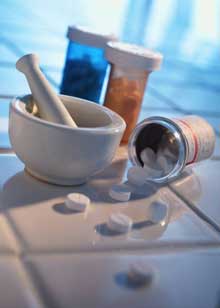Fake medications inundate the Russian pharmaceutical market
The Russian experience in introducing special marks for licensed video and audio production has not resulted in any positive changes
The problem with fake medications has become very serious on the Russian pharmaceutical market. The Russian Federal Healthcare Supervisory Service has recently put forward a suggestion to introduce a new regulation, which would oblige all pharmaceutical companies to mark their products. 
According to the information from the Russian Internal Affairs Ministry and the Ministry for Healthcare and Social Development, fake medications currently comprise from 3,5 to 12 percent of pharmaceutical products in Russia. Independent experts present a different figure – 20 percent, whereas certain infringing medical goods reach the level of 60 percent.
According to other estimations, only 15 percent of Russian pharmaceutical companies acquire raw materials for their production directly from manufacturers. The remaining 85 percent, experts say, receive medicinal substances through offshores, with the help of non-transparent schemes. Needless to say that the quality of such raw materials leaves much to be desired, but the cost of such goods, the expiry date of which is very close, is a lot lower in comparison with high-quality products.
The idea to introduce special measures for the identification of medications appeared in Russia last year. Mikhail Zurabov, the Russian Minister for Healthcare, promised President Putin in October 2004 that the ministry would develop the new supervisory system for the pharmaceutical production. The minister specified that the marking of medicinal products would be used as the basic solution on the matter.
The ministry has not backed any suggestions to protect the pharmaceutical market from fake products. The suggestions included several new identification means – from holograms to phosphors. The head of the Federal Healthcare Supervisory Service, Ramil Khabriyev, supported the idea of using new protective marks (consisting of a bar code and a hologram) for the entire pharmaceutical industry of Russia. The official claimed that it would be the optimal and real protection for medical products. “Manufacturers will have to coordinate the issue and introduce the new protective system. It will automatically remove the problem of fake medicines,” Khabriyev said. In addition, the introduction of pharmaceutical marks will simplify the forthcoming abolishment of certification for the industry and ease inspection procedures for the service as well, the official believes.
Market members believe that the innovative measure is not likely to improve the situation in the Russian pharmacy. The executive officer of the association of Russian pharmaceutical makers, Oleg Mikhailov, said in an interview with the Business newspaper that the spending on the marking of drugs would most likely exceed the cost of the currently used certification six times. “Prices on medicines will definitely rise on account of the additional spending on both the mark itself and additional technologies, which will have to be involved in the process too,” another expert, Yuri Krestinsky said. Furthermore, specialists say that many Russian pharmaceutical makers are already using their own protection means for their medicines. To crown it all, the unification of the protective mark will most likely become a great attraction for pirate producers. “Since we have those, who can make fake medications, there will obviously be those, who will make fake marks,” experts believe.
It is noteworthy that the Russian experience in introducing special marks for licensed video and audio production has not resulted in any positive changes: fake DVDs and CDs still inundate the Russian market. Furthermore, one may buy both counterfeit and even authentic license marks easily.
Subscribe to Pravda.Ru Telegram channel, Facebook, RSS!




